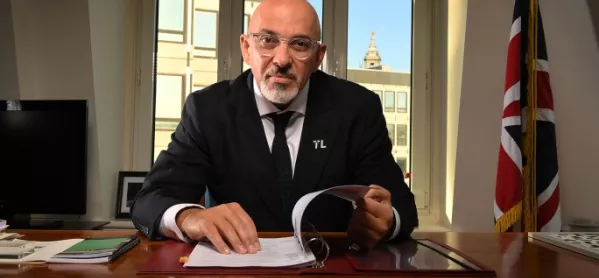Schools Bill: DfE scraps academy power measures after backlash

The government is to scrap parts of its controversial Schools Bill after heavy criticism in the House of Lords.
In a letter to peers today, schools minister Baroness Barran said that plans were underway to “remove clauses 1 to 4 and schedule 1 from the Bill”, which focus on academy standards and regulation.
She said this would be done by supporting amendments that were tabled in the House of Lords to scrap clauses 1, 3 and 4, and that a further amendment would be proposed to scrap clause 2 and schedule 1.
The move comes after concerns were raised by peers and multi-academy trust leaders about the scope of the Bill to give Whitehall greater power over how academies operate.
- The education secretary: Nadhim Zahawi on what he will do next
- Academies: Heads warn of lack of clarity on whether schools will be forced to join MATs
- MAT expansion: Allowing councils to establish MATs ‘will lead to rapid academy growth’
Clauses 1-3 would give the education secretary the power to make regulations to set “academy standards”, whilst clause 4 would commit academy trusts to follow any Department for Education guidance issued that relates to the academy standards.
Baroness Barran’s letter also says that concerns have been raised about clauses 5-18 and schedule 2, which cover trust termination and intervention powers. She says that amendments to scrap these would also be supported by the government.
DfE rows back on plans for academy trust regulation
Responding to the announcement, a DfE spokesperson said that the government remained “committed to the Schools Bill putting clear academy trust standards on a legal footing, and allowing for the government to intervene directly in the rare cases of academy trust failure”.
But they added: “We are listening to concerns from peers about how the provisions in the Bill would operate in practice, and will make sure the Bill protects and strengthens the fundamental freedoms academies enjoy.
“That is why we are supporting the temporary removal of clauses 1-18 from the Bill, in advance of bringing back revised clauses later in the Bill’s passage through Parliament.”
Education secretary Nadhim Zahawi (pictured) has previously admitted that there have been concerns about the scope of the government’s plans to hold multi-academy trusts to account through its new Schools Bill.
Heads’ leaders welcomed the latest move, describing the scrapped measures as a “ridiculous attempt to centralise powers in Whitehall”.
Geoff Barton, general secretary of the Association of School and College Leaders, said: “We are pleased that the government is scrapping clauses in the Schools Bill which would have handed unprecedented powers to the education secretary over virtually every aspect of the running of academies, from the length of the school day to the spiritual development of pupils to the handling of complaints.
“It was a ridiculous attempt to centralise power in Whitehall over matters which are obviously much better decided by professional educators who know the needs of their schools and their pupils.
“We note that the government intends to come back with new proposals as part of its drive for full academisation. We hope that these proposals will be far more proportionate and sensible.”
Bridget Phillipson, Labour’s shadow education secretary, said Baroness Barran’s announcement signalled a “major climbdown” from a “chaotic government”.
“This is a major climbdown from Nadhim Zahawi and confirms this chaotic government has no plan to drive up standards in our schools and improve outcomes for our children,” she said.
“Just days ago the schools minister told the Commons these were important provisions. Now the government has binned them. The Conservatives are in a mess, trying to rush through laws to avoid scrutiny and distract from their own incompetence.”
Earlier this month Mr Zahawi told the Confederation of School Trusts’ annual conference that the government planned to create a baseline of required standards that MATs will be expected to meet, in order to prevent the reputation of the sector being damaged by failing trusts.
This draft Schools Bill set out standards that the education secretary may require MATs to meet as part of the new regulations.
It lists 20 examples of where standards might be set, including the nature and quality of education provided; the curriculum followed; the length of the school day; the remuneration of staff; and governance arrangements.
Yesterday the DfE launched a new review into how these standards would be set and the circumstances in which ministers would intervene at underperforming MATs.
You need a Tes subscription to read this article
Subscribe now to read this article and get other subscriber-only content:
- Unlimited access to all Tes magazine content
- Exclusive subscriber-only stories
- Award-winning email newsletters
Already a subscriber? Log in
You need a subscription to read this article
Subscribe now to read this article and get other subscriber-only content, including:
- Unlimited access to all Tes magazine content
- Exclusive subscriber-only stories
- Award-winning email newsletters
topics in this article



